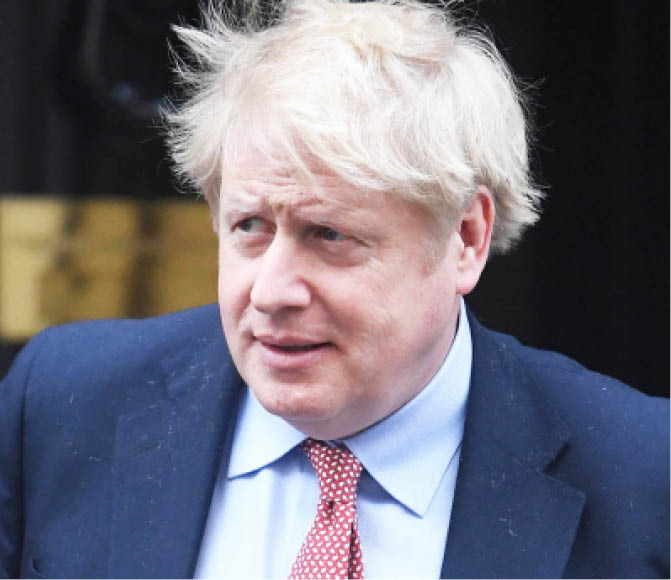Recently, the British authorities, after confirming through months of painstaking investigation into allegations of breaching COVID-19 protocols levelled against British Prime Minister, Boris Johnson, decided to fine him for his indiscretion.
It was discovered that sometime in May 2020, at the height of the COVID-19 pandemic which resulted in the deaths of so many in Britain and the world at large which necessitated severe restrictions on the gathering of people to stem the pandemic, Mr Johnson broke those rules by organising and attending a party at No 10 Downing Street, his official residence.
N-Power beneficiaries, CSO raise N20m for Kano gov’ship aspirant
PDP elders dismiss Ango Abdullahi’s consensus, task aspirants
From the investigations, the British police found out that Mr Johnson’s indiscretion was not a one-off thing, but a series of violations during the height of the COVID-19, which ironically his office took the lead in battling.
Predictably, the opposition Labour Party led the other opposition parties in expressing outrage of the British people over what has now become known as “Partygate’’ in Britain.
But there was also condemnation from members of Mr Johnson’s own ruling Conservative Party, who believed the prime minster behaved in a manner that brought disrepute to the exalted office he occupied and was deserving of the punishment meted out to him.
As more and more revelations are coming to the surface on Mr Johnson’s alleged misdemeanours on the COVID-19 protocols, it is expected that the British police, as is their practice and reputation, will do a thorough job and return an acceptable verdict which will further reinforce their efficacy as an independent institution of government.
The watching world will no doubt be interested to see how this progresses and possibly learn some lessons on how a well-developed democratic society like Britain deals with an issue of governance involving its leaders.
Certainly, there is something worth applauding and emulating in the way the British police is investigating the issue, which is professionally and without any fear or favour. In throwing the rule book at the prime minister, the British police quite clearly underscored that the independence of institutions is indispensable to the functioning and sustenance of democracy. This is in stark contrast with the situation in Nigeria, where the police and other democratic institutions often cannot hold their own when faced with similar situations. If they are not deliberately bungling cases brought before them unprofessionally, they are subject to interference in their investigation of cases involving high calibre of persons as our experience demonstrates.
Accordingly, we call on the Nigerian political establishment to imbibe the lessons of the Mr Johnson debacle in Britain.
We observed that when the allegations against Mr Johnson were first made, nobody attributed them to a witch hunt against his person or wherever he hails from. There were no publications in the media or public processions in dubious solidarity or support for the embattled prime minister from his constituency designed to obscure the course of justice.
And when growing public outrage compelled the British police to wade in and investigate the matter, the prime minister did not seek to obstruct police investigation through overt and covert legal subterfuges. And even though he repeatedly sought to exonerate himself through some dubious sophistry during parliamentary and public debates on the matter, when the police eventually found him indeed guilty in breach of the COVID-19 protocols as alleged and fined him accordingly, Mr Johnson was not only contrite, he accepted and complied with the punishment handed out to him. Indeed so outraged by the police findings on Mr Johnson that his justice minister promptly resigned rather than face the opprobrium of serving a prime minister so tainted by what amounts to an avoidable scandal.
The lessons for especially the Nigerian political establishment are that rather than place emphasis on strong individuals as we are wont to do in our democratic practice, we should instead allow democratic institutions like the police and judiciary play their independent roles in sustaining our democracy.
It also behoves the political elite as public figures to always subject themselves and their ways to the scrutiny of public institutions when the need arises as we have seen with the case of Prime Minister Boris Johnson. All too often we hear our political figures citing the case and examples of democracies like the United States of America and Britain to justify one political expediency or another, which is mostly in furtherance of their privileges as political representatives. But as we also have seen they seldom observe the temperament and nuance that democratic practice demands and entails from them.
As the whole issue of Britain’s Partygate clearly demonstrates, we can only hope to sustain democracy by imbibing its tenets.

 Join Daily Trust WhatsApp Community For Quick Access To News and Happenings Around You.
Join Daily Trust WhatsApp Community For Quick Access To News and Happenings Around You.


